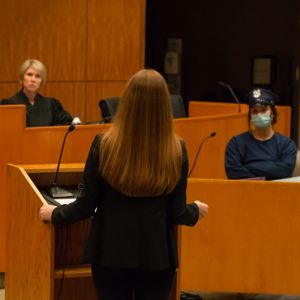J.D. Program
Established in 1924, the school prepares students for success through a challenging curriculum taught by nationally recognized faculty. The program has alumni in all 50 states, the District of Columbia, two territories and 20 countries with successful careers in the legal profession as well as other fields.
The School of Law offers a full-time, three-year program leading to a Juris Doctor degree. The degree is conferred upon satisfactory completion of 90 semester hours, including 42 hours of required courses. Students are often referred to as 1Ls, 2Ls or 3Ls depending on the number of years they have been in the program.
Your first year at the School of Law will be a rigorous course of study that all 1Ls follow. Starting at new student orientation and continuing throughout your first year, you will begin to learn, write and think about the law through courses such as Civil Procedure, Contracts and Legal Writing.
A broad selection of elective second- and third-year courses is available. Students who have completed the first year of law school may earn up to 12 semester hours of credit in summer school, study abroad or intersession courses. Graduation may be accelerated by one semester by earning credit outside the regular semester courses.
You will have opportunities to participate in clinics, externships, pro bono work and competitions. Two specialized certificate programs and four dual degree programs are also available to qualified students.
3/3 Programs

3/3 Program in Arts and Sciences
The School of Law and the J. William Fulbright College of Arts & Sciences offer a program that enables outstanding students to enter the School of Law after their third year of college. Students in the Fulbright College are eligible to begin at the School of Law after the completion of at least 94 hours of college work if they have completed certain other requirements. See the School of Law Catalog for more information →
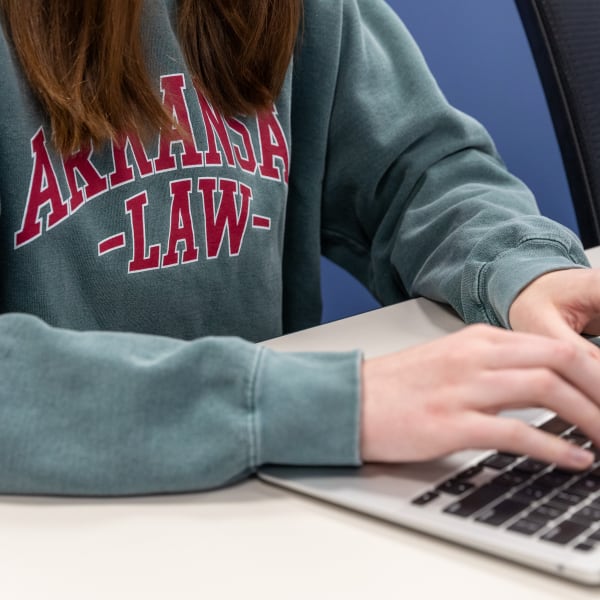
3/3 Program in Agriculture
Exceptional students in the pre-law concentration in the Dale Bumpers College of Agricultural, Food and Life Sciences may enroll in the School of Law in their fourth year provided that all requirements have been met. See the School of Law Catalog for more information →
Dual Degree Programs

J.D./M.A. Program
The School of Law and the department of political science provide a dual J.D. and M.A. in international law and politics. Students in this program must be admitted both to the School of Law and the Graduate School department of political science. See the Law School Catalog for more info →

J.D./M.B.A. Program
The School of Law and the Walton College of Business cooperate in offering an opportunity for students to pursue the J.D. and the Master of Business Administration degrees (M.B.A.) concurrently. See the Law School Catalog for more info →

J.D./M.P.A. Program
The University of Arkansas department of political science, the Graduate School, and the School of Law cooperate in offering a dual-degree program that allows students to pursue the Master of Public Administration (M.P.A.) and J.D. degrees concurrently. See the Law School Catalog for more info →

J.D./M.S.W. Program
The School of Law and the School of Social Work provide an opportunity for students to pursue the Juris Doctor (J.D.) and the Masters of Social Work (M.S.W.) degrees concurrently. See the Law School Catalog for more info →
Experiential Learning
Students are required to earn a minimum of six credit hours of experiential learning coursework. Experiential learning courses include clinics, externships, and simulation classes. In addition to experiential learning courses, the law school offers experiences like pro bono work and trial competitions.
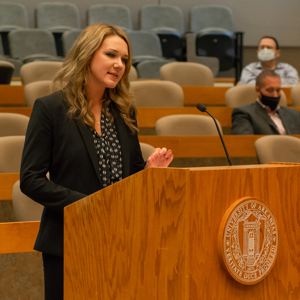
Clinics
Our Legal Clinic, first directed by then-professor Hillary Rodham Clinton in 1975, gives students hands-on skills training by representing real clients in real life situations and provides legal services to the community.
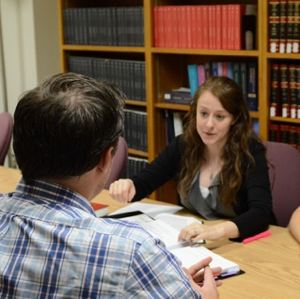
Externships
Externships allow students to actively participate in a legal field while earning academic credit. Opportunities include six clinics and nine externship programs, including Fortune 100 companies.

Pro Bono
Our Pro Bono and Community Service Program matches law students with legal services agencies, nonprofits and members of local bar associations to assist in the provision of free legal services.
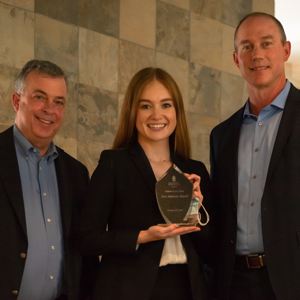
Trial Competitions
The law school hosts three internal competitions that lead to the selection of moot court, trial, and client advocacy competition teams that travel to regional and national competitions.
Learning Outcomes
The faculty has adopted the following as the learning outcomes expected as a result of our J.D. program:
- 1. Our graduates will have an understanding of their ethical responsibilities.
- Graduates should demonstrate a fundamental understanding of the ethical responsibilities of an attorney as a client representative, officer of the court, and member of society.
- 2. Our graduates will understand the law.
- Graduates should demonstrate a fundamental understanding of the basic elements of substantive law, procedure, and legal theory.
- 3. Our graduates will be able to communicate the law.
- Graduates should demonstrate effective oral and written communication skills in the context of predictive, persuasive, and prescriptive application of the law.
- 4. Our graduates will be able to use the law.
- Graduates should demonstrate a reasonable array of legal practice skills, including the ability to conduct legal research, to engage in problem solving, to interact with clients, and to advocate on their behalf.
- 5. Our graduates will be professionals.
- Graduates should demonstrate professionalism by conducting themselves in a professional manner, including by participating in opportunities to increase their professional knowledge and skills.
